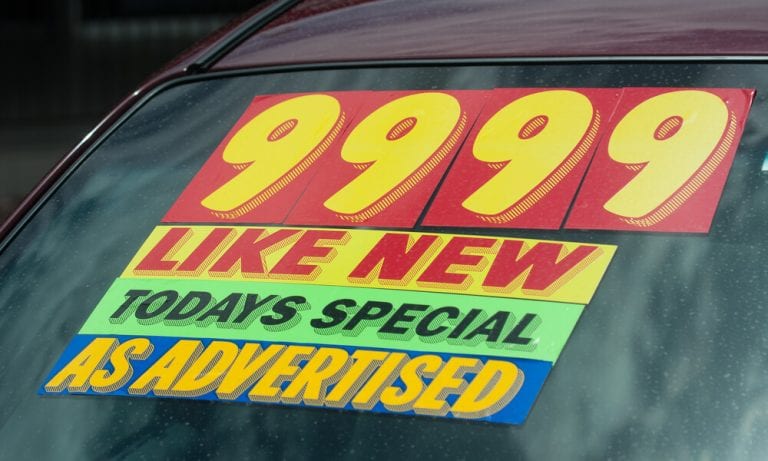The Truth About Used Car Prices
Before you buy a used car from a car dealer, you should understand a little about pricing. A franchise dealer with a used car operation will usually price his cars at a certain percentage more than what the car is deemed to be worth on the wholesale market.
The wholesale value of a car is usually determined by factors such as the demand for the car coupled with the age, make, model, options, mileage and general condition. The dealer’s markup on a used car, van or pickup is frequently determined by any or all of several factors:
- The price the dealer paid to acquire the car. He might have taken it in trade against a new car – which means that he accepted the car in lieu of cash or he might have purchased it from a private seller, wholesaler or at auction.
- The dealer adds what it has cost him to repair and recondition the car.
- The dealer adds a markup to cover his profit objectives and to pay for his overhead.
The markup also will reflect such things as the condition of the car, mileage, make, model, options and most important, market demand. The point, simply, is that used car markups will vary greatly for any number of factors. Your objective is to discover the dealer’s cost to buy and recondition the car and put it on his lot. That will give you the basis for planning your negotiation.
Tricks of the Trade
Many dealers also will include a “negotiation pad” in their markups. They recognize that most people won’t buy a car – new or used – unless they feel they’re buying it for less than the advertised price. So a dealer will build in a large enough cushion to give the buyer a discount and still end up with whatever he considers to be a reasonable, or maybe even a more than reasonable, profit.
The key to a dealer’s survival and profitability in the used car business is to buy used cars at or below what the industry calls the “wholesale price” and then to sell them at a retail price that, in the final analysis, is whatever a buyer will pay.
Here is an actual example: I tracked a GM car that was purchased by a dealer for $9,500. After spending $400 for repairs and reconditioning, he put it on the lot at $13,800. That’s a markup over his purchase cost of more than 45 percent!
The used car sales manager confided that this markup gave him built-in room for negotiation. A buyer finally appeared and, after a negotiated agreement, bought the car for $12,450. The customer felt he got a good deal and the seller said nothing to disabuse him of that notion.
Whether you buy from a private owner or a dealer, one of the most important pieces of information you can obtain is the current “wholesale” price of the car in your area of the country. One source of auto price information is the car loan department of your bank. They usually will have all the latest price books and possibly even auction reports that show what various makes are bringing on the auction market.
Book Prices
The industry uses any of several books as price guides: The NADA Official Used Car Guide, National Auto Research Black Book, Kelley Blue Book Auto Market Report and Galves Auto Price List. These books – also available online – purport to reflect the average wholesale prices that various cars are bringing across the country. The only problem is that they usually don’t agree on a set price.
Compare the suggested wholesale prices for a 2000 Chevrolet four-door Lumina from the same month:
Kelley Blue Book: $7,875 (tends to reflect west coast prices)
NADA: $6,875 (combination of auction and dealer reports)
Black Book: $5,650 to $8,850 (dealer auction sales reports)
You can find used car price books on your newsstand or on various Internet sites, such as Edmunds.com. For example, Edmunds’ wholesale price for a 2000 Lumina is $7,387. Its figures provide a general range but may not present a true picture of any given car’s “real” price because it cannot account for the myriad factors that impact the dealer’s costs.
Use our Auto Loan Calculator to determine how much car you can afford.

